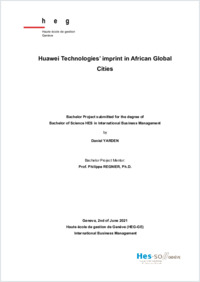Huawei technologies’ imprint in African global cities
SONAR|HES-SO
- Yarden, Daniel
- Régnier, Philippe (Degree supervisor)
- Genève : Haute école de gestion de Genève
87 p.
Bachelor of Science HES in International Business Management: Haute école de gestion de Genève, 2021
English
This bachelor thesis investigates the operational strategy of Huawei Technologies Inc, the B2B telecommunication equipment business unit at Huawei, in the context of internationalization towards Africa. The objective of this paper is to understand what factors have led a Chinese multinational company, in the space of two decades, into the dominant position they enjoy today, with reportedly 70% of market share in the telecommunication equipment line of business in Africa. Through research, it quickly became clear that Huawei was targeting specific and strategic areas to install their offices. These areas share common characteristics such as geographical strategic location, urban intensive development and have inherent international natures. These cities, based on their common characteristics have been studied for decades by various historians, sociologists, and economists. They have all contributed in shaping the concept of global city as they uncovered the intertwined network linking these cities to one another across the globe. Three cities across the entire African continent qualify today as global cities: Johannesburg, Cairo, and Casablanca. Interestingly enough, Huawei operations in these markets have been far from anecdotal with state-of-the-art facilities and plenty of CSR initiatives to lift the communities and build relationships for the future. These three ecosystems have been remarkably fertile for Huawei who seems to have understood the complexities of each and managed to navigate with superior ability to their competitors. The factors of such success can be credited to Huawei and their agile nature, with special attention towards customer-centricity, innovation, and training. But we cannot hide from the fact that China has been extremely active on the African continent these past decades which surely played a role in Huawei’s penetration success in such diverse markets. Through primary data collection, I was able to bring a unique and practical perspective to this paper. This dimension sets my research apart from what has been previously done on the topic. The sole focus on African global cities is also a choice that makes my paper standout from the crowd. It is important to note that this thesis is mainly composed of qualitative data as the topic simply does not call for figures. This thesis is all about navigating through fiction and reality whilst comparing divergent views in an effort to extract the most valuable pertinent analysis possible. Based on the research conducted, I believe Huawei should pursue the leveraging of the knowledge they acquired by working in extremely diverse markets and create knowledge centres, essentially training facilities, to further exploit their competitive advantage as a global service provider. This would enable them to consolidate their relationships within the markets whilst encouraging creative ideas to bolster innovation. But these practices can only be successful if they manage to keep their stakeholders onboard which essentially means they must double up their efforts to appeal through communication, transparency and show an open face to avoid trust from vanishing with the negative claims attacking the firm’s business integrity.
- Language
-
- English
- Classification
- Economics
- Notes
-
- Haute école de gestion Genève
- International Business Management
- hesso:hegge
- Persistent URL
- https://folia.unifr.ch/global/documents/319714
Statistics
Document views: 312
File downloads:
- IBM_BT21_YARDEN_Daniel.pdf: 520
